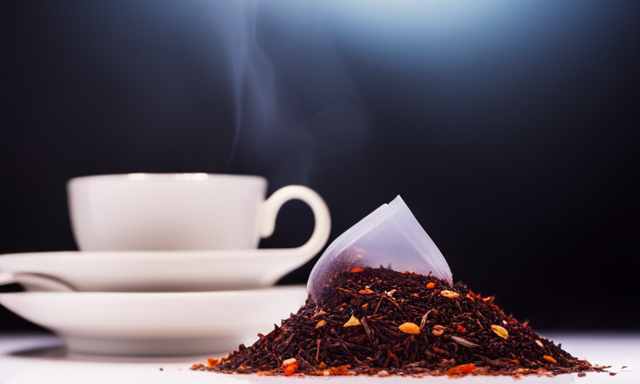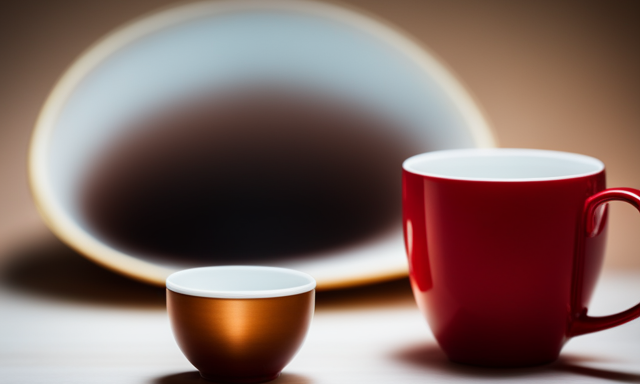Did you know that rooibos tea is not only delicious but also packed with numerous health benefits?
In fact, studies have shown that this caffeine-free herbal tea has been linked to a range of positive effects on the body. From boosting the immune system and aiding digestion to promoting relaxation and reducing stress, the benefits of rooibos tea are truly remarkable.
Additionally, rooibos tea is known for its heart health benefits, thanks to its ability to support cardiovascular function. Not only that, but it also possesses anti-inflammatory properties, making it a great choice for those looking to reduce inflammation in the body.
Furthermore, rooibos tea is hydrating and nourishing for the skin, making it a natural choice for those seeking a radiant complexion.
Incorporating rooibos tea into your daily routine is a simple and enjoyable way to reap these incredible benefits. So, grab a cup and start experiencing the goodness of rooibos tea today.
Key Takeaways
- Boosts immune system
- Aids digestion
- Promotes relaxation and reduces stress
- Provides cardiovascular health benefits
The Origins of Rooibos Tea
If you’re curious about where rooibos tea comes from, you’ll be delighted to know that it traces its roots back to the Cederberg region of South Africa. This unique herbal tea, also known as red bush tea, has been consumed for centuries by the indigenous people of the area.
The rooibos plant, scientifically known as Aspalathus linearis, is native to this region and is cultivated under specific conditions. The sandy soil, hot summers, and cold winters of the Cederberg region create the perfect environment for rooibos to thrive. The plant is harvested, fermented, and dried to produce the tea leaves. This traditional and sustainable cultivation method ensures the preservation of the plant’s natural flavors and beneficial properties.
Now that we’ve explored the origin and cultivation of rooibos tea, let’s delve into its nutritional profile.
Nutritional Profile of Rooibos Tea
When you sip on a warm cup of rooibos, you’ll be surprised by the array of nutrients it offers. Rooibos tea is packed with essential minerals such as calcium, magnesium, and manganese, which are vital for maintaining healthy bones and teeth.
Additionally, it contains antioxidants like aspalathin and nothofagin, which help protect the body against oxidative stress and reduce the risk of chronic diseases.
Studies have also shown that rooibos tea may have anti-inflammatory properties, making it beneficial for individuals with inflammatory conditions. Moreover, drinking rooibos tea has been associated with improved heart health, as it can help lower blood pressure and cholesterol levels.
With its impressive nutritional profile, rooibos tea is a great addition to a balanced diet for overall well-being. Transitioning to the subsequent section about ‘boosting the immune system,’ rooibos tea can also support our body’s natural defense mechanisms.
Boosting the Immune System
Boosting the immune system is an important aspect of maintaining good health. One way to achieve this is through the consumption of antioxidants, which play a crucial role in strengthening our immune system.
Numerous studies have been conducted to explore the immune-boosting properties of rooibos tea, showcasing its potential as a natural and effective way to support our immune system.
Role of antioxidants in strengthening the immune system
One of the benefits of rooibos tea is that its antioxidants help strengthen the immune system, keeping you healthy and protected. Antioxidants are compounds that protect our cells from damage caused by harmful molecules called free radicals. They neutralize these free radicals and prevent them from causing oxidative stress, which can weaken the immune system. Rooibos tea is particularly rich in antioxidants, such as aspalathin and quercetin, which have been shown to have immune-boosting properties. Studies have found that these antioxidants can enhance the production of immune cells and improve their function, leading to a stronger immune response. Incorporating antioxidant-rich foods and immune-boosting teas like rooibos into your diet can provide long-term benefits for your immune system. Transitioning into the subsequent section, studies have explored the immune-boosting properties of rooibos tea without writing ‘step’.
Studies on the immune-boosting properties of rooibos tea
Incorporating studies on the immune-boosting properties of rooibos tea can help you understand the scientific evidence behind its effectiveness, providing a more informed perspective on its potential benefits for your health.
Several studies have explored the immune-boosting effects of rooibos tea and have shown promising results. One study published in the Journal of Ethnopharmacology found that rooibos tea increased the production of antibodies, which play a crucial role in the immune response.
Another study conducted by the South African Medical Research Council highlighted the potential of rooibos tea in boosting the activity of certain immune cells. These immune-boosting properties of rooibos tea can contribute to a stronger immune system, helping to protect against infections and diseases.
Transitioning into the subsequent section about aiding digestion, it is important to note that rooibos tea has also been studied for its potential benefits in this area.
Aiding Digestion
Improve your digestion with the delightful benefits of rooibos tea. This herbal tea has been found to promote gut health and relieve bloating, making it a great choice for those struggling with digestive issues.
Rooibos tea contains antioxidants and anti-inflammatory compounds that can help soothe the digestive system and reduce inflammation. It also contains natural enzymes that aid in the breakdown of food, improving digestion and nutrient absorption.
Additionally, rooibos tea is caffeine-free, which means it won’t irritate the stomach or cause acid reflux like some other beverages. So, if you’re looking for a natural way to support your digestive health, incorporating rooibos tea into your daily routine may be beneficial.
Next, let’s explore how rooibos tea can promote relaxation and reduce stress.
Promoting Relaxation and Reducing Stress
Rooibos tea has been shown to have calming effects on the nervous system, which can help reduce stress and promote relaxation. Studies have found that the antioxidants in rooibos tea can help regulate cortisol levels, the hormone responsible for stress.
Additionally, rooibos tea has been found to have a positive impact on sleep quality, making it an excellent choice for those looking to improve their sleep.
Calming effects of rooibos tea on the nervous system
Sipping on a warm cup of rooibos tea can feel like a soothing blanket wrapping around your frazzled nerves. It has been found that rooibos tea has calming effects on the nervous system, which can help in reducing stress and promoting relaxation. Research suggests that certain compounds present in rooibos tea, such as aspalathin, have the ability to regulate the stress hormones in our body, thus promoting a sense of calmness. Additionally, rooibos tea contains antioxidants, such as quercetin and luteolin, which have been shown to have neuroprotective properties and may help in reducing anxiety. To better understand the calming effects of rooibos tea, imagine a table with two columns and four rows. In the left column, visualize your stress levels before drinking rooibos tea, while in the right column, picture your stress levels after enjoying a cup of this soothing beverage. This mental image highlights the potential relaxation that rooibos tea can provide. Moving on to the next section, let’s explore the role of rooibos tea in promoting better sleep.
Role of rooibos tea in promoting better sleep
Drifting off into a peaceful slumber becomes easier with the comforting embrace of a warm cup of rooibos tea. This South African herbal tea has been shown to have numerous benefits when it comes to promoting better sleep and improving sleep quality.
-
Rooibos tea contains a natural compound called aspalathin, which has been found to have calming effects on the nervous system. This can help reduce anxiety and stress, allowing for a more relaxed state of mind before bedtime.
-
The tea also contains antioxidants, such as quercetin and luteolin, which have been linked to improved sleep quality. These antioxidants help reduce inflammation in the body, which can interfere with sleep.
-
Additionally, rooibos tea has been found to have sedative properties, making it an effective natural remedy for reducing insomnia and promoting a more restful sleep.
By incorporating rooibos tea into your nightly routine, you can experience the benefits of improved sleep quality and reduced insomnia.
Transitioning into the subsequent section about managing diabetes and blood sugar levels, rooibos tea has also shown promising results in this area.
Managing Diabetes and Blood Sugar Levels
Indulging in the warm embrace of rooibos tea is like taming the fiery dragon of diabetes, effortlessly keeping blood sugar levels in check. Research has shown that rooibos tea contains a flavonoid called aspalathin, which has been found to have anti-diabetic properties. Aspalathin helps to regulate blood sugar levels by enhancing insulin secretion and improving insulin resistance.
In addition, rooibos tea is low in calories and sugar, making it a suitable beverage for individuals managing diabetes. Regular consumption of rooibos tea has been associated with improved glycemic control and reduced risk of developing complications related to diabetes.
Transitioning into the subsequent section about supporting heart health, rooibos tea has also been shown to have positive effects on cardiovascular health.
Supporting Heart Health
Take a moment to consider how your heart’ll thank you for incorporating this delightful herbal infusion into your daily routine. Rooibos tea offers several benefits for heart health and provides cardiovascular support.
Here are five reasons why it can be beneficial:
-
Reduces blood pressure: Studies’ve shown that rooibos tea can help lower blood pressure, reducing the risk of heart disease.
-
Antioxidant-rich: Rooibos tea’s packed with antioxidants, which can help protect the heart from oxidative stress and inflammation.
-
Lowers cholesterol levels: Regular consumption of rooibos tea’s been associated with a decrease in LDL cholesterol levels, which can contribute to heart health.
-
Improves blood circulation: The flavonoids found in rooibos tea’ve been shown to improve blood circulation and enhance overall cardiovascular function.
-
Anti-inflammatory properties: Rooibos tea’s anti-inflammatory effects can reduce inflammation in the blood vessels and promote heart health.
By incorporating rooibos tea into your daily routine, you can provide essential support to your heart and enjoy the many cardiovascular benefits it offers.
Anti-inflammatory Properties
With its anti-inflammatory properties, incorporating rooibos tea into your daily routine can provide essential support to your heart and promote cardiovascular health. Research suggests that rooibos tea contains various compounds that have anti-inflammatory effects, such as polyphenols and flavonoids. These compounds help reduce inflammation in the body, which is a key factor in the development of heart diseases. By consuming rooibos tea regularly, you can potentially lower the risk of heart-related conditions, such as hypertension and atherosclerosis. Additionally, incorporating anti-inflammatory foods and natural remedies into your diet can further enhance the benefits of rooibos tea. Inflammation is not only detrimental to heart health but also to overall well-being. Moving on to the next section, let’s explore how rooibos tea can help in hydrating and nourishing the skin.
Hydrating and Nourishing the Skin
I’ve found that rooibos tea has some impressive moisturizing effects on the skin. It’s believed to help improve hydration levels and retain moisture, making it beneficial for individuals with dry or sensitive skin. Additionally, the tea contains antioxidants that may help protect the skin from environmental damage and promote a healthy complexion.
Moisturizing effects of rooibos tea on the skin
The moisturizing effects of rooibos tea on the skin are simply amazing. This delicious herbal tea is not only a refreshing beverage, but it also offers numerous benefits for skin health. Rooibos tea contains natural compounds that have moisturizing properties, helping to hydrate the skin and keep it looking supple and youthful.
To better understand the moisturizing effects of rooibos tea, let’s take a look at the following table:
| Moisturizing Properties of Rooibos Tea |
|---|
| Hydrates the skin |
| Locks in moisture |
| Soothes dry and irritated skin |
| Improves skin elasticity |
As you can see, rooibos tea has multiple benefits when it comes to moisturizing the skin. It helps to hydrate and nourish the skin, locking in moisture and improving elasticity. Additionally, it has soothing properties that can alleviate dryness and irritation. These moisturizing effects make rooibos tea a great option for individuals with dry or sensitive skin.
Now, let’s explore the potential benefits of rooibos tea for individuals with dry or sensitive skin.
Potential benefits for individuals with dry or sensitive skin
Indulging in rooibos tea is like a soothing oasis for parched skin, providing a much-needed burst of hydration and relief for those with dry or sensitive skin. Here are some potential benefits for individuals with dry or sensitive skin:
-
Hydrating skin: Rooibos tea contains natural moisturizing properties that can help replenish and retain moisture in the skin, leaving it soft and supple.
-
Soothing inflammation: The anti-inflammatory properties of rooibos tea can help calm irritated skin and reduce redness and inflammation associated with dryness or sensitivity.
-
Antioxidant protection: Rooibos tea is rich in antioxidants, such as aspalathin and nothofagin, which help protect the skin against free radicals and oxidative stress.
-
Anti-aging effects: The antioxidants in rooibos tea can also help fight signs of aging, such as fine lines and wrinkles, by promoting collagen production and improving skin elasticity.
-
Gentle and non-irritating: Unlike some other teas or skincare products, rooibos tea is gentle on the skin and is less likely to cause irritation or allergic reactions.
Incorporating rooibos tea into your daily routine can be a simple and effective way to nourish and care for your dry or sensitive skin.
Incorporating Rooibos Tea into Your Daily Routine
When it comes to incorporating rooibos tea into my daily routine, I’ve found that there are numerous ways to prepare and enjoy this delicious beverage. Whether I choose to brew a hot cup of rooibos tea, make a refreshing iced tea, or even use it as a base for a smoothie, the options are endless.
Additionally, I’ve learned that selecting high-quality rooibos tea products is essential for maximizing the health benefits and flavor. I always look for organic, loose-leaf rooibos tea from reputable brands that prioritize sustainable farming practices to ensure that I’m getting the best possible product.
Different ways to prepare and enjoy rooibos tea
One delicious way to prepare and enjoy rooibos tea is by adding a splash of milk and a hint of honey for a creamy and sweet twist. This combination not only enhances the flavor of the tea, but also adds a touch of richness and sweetness that can be truly satisfying.
Rooibos tea itself has a naturally sweet and nutty flavor, and when paired with the creaminess of milk and the sweetness of honey, it creates a delightful and comforting beverage.
Aside from the different flavor combinations, rooibos tea also offers numerous health benefits. It’s rich in antioxidants, which help protect the body against free radicals and reduce the risk of chronic diseases. Rooibos tea is also caffeine-free, making it a great alternative for those who want to reduce their caffeine intake. Additionally, it has anti-inflammatory properties and may help improve digestion and relieve stomach cramps.
Now, let’s move on to the next section about tips for selecting high-quality rooibos tea products.
Tips for selecting high-quality rooibos tea products
To ensure you’re getting the best quality, look for rooibos tea products that have been sourced from reputable growers and are certified organic. When selecting tea brands, it’s important to consider the origin and production methods. Opt for brands that have a reputation for high-quality sourcing and sustainable practices. Additionally, pay attention to the brewing techniques recommended by the brand. Different brands may have specific instructions for water temperature, brewing time, and the amount of tea to use. Following these guidelines can help you achieve the best flavor and health benefits from your rooibos tea. To make your selection process easier, here’s a comparison table of some popular rooibos tea brands:
| Brand | Origin | Certification |
|---|---|---|
| Brand A | South Africa | Organic |
| Brand B | Kenya | Fair Trade |
| Brand C | Malawi | Rainforest Alliance Certified |
Remember, the key to selecting high-quality rooibos tea lies in choosing reputable brands and following their recommended brewing techniques.
Frequently Asked Questions
Can rooibos tea be consumed by pregnant women?
During pregnancy, it’s best to avoid rooibos tea. While it has numerous benefits, including antioxidants and no caffeine, it may affect hormone levels and potentially lead to complications. Remember, "better safe than sorry."
Does rooibos tea contain caffeine?
Yes, rooibos tea is caffeine-free, making it a great alternative to caffeinated beverages. It also offers various health benefits, including antioxidants, improved digestion, and reduced inflammation.
Is rooibos tea safe for children?
Rooibos tea is safe for children as it doesn’t contain caffeine. It can actually be beneficial for them, as it doesn’t cause allergies and can promote better sleep.
Can rooibos tea help with weight loss?
Rooibos tea may aid in weight loss due to its potential metabolism-boosting properties. However, pregnant women should exercise caution as the tea may interfere with iron absorption. It’s always best to consult with a healthcare professional before making any dietary changes.
How does rooibos tea compare to other herbal teas in terms of taste?
Rooibos tea has a distinct flavor compared to other herbal teas. It offers a naturally sweet and nutty taste, with hints of vanilla and honey. This unique flavor profile sets it apart from other herbal teas.
Conclusion
In conclusion, the benefits of rooibos tea are truly tantalizing. This remarkable beverage not only nourishes the body but also nurtures the soul.
With its immune-boosting, digestion-aiding, and heart-supporting properties, rooibos tea is a must-have in your daily routine. Its anti-inflammatory effects and hydrating abilities are like a healing hug for your skin.
So why wait? Embrace rooibos tea and experience its remarkable rewards. Rejuvenate, relax, and revel in the wonders of this wondrous brew. Cheers to a healthier and happier you!










